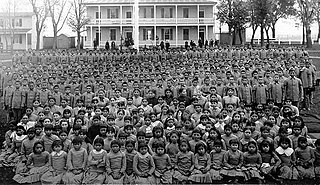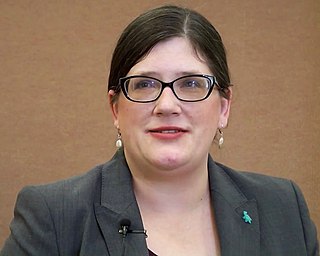Related Research Articles

The Indian Reorganization Act (IRA) of June 18, 1934, or the Wheeler–Howard Act, was U.S. federal legislation that dealt with the status of American Indians in the United States. It was the centerpiece of what has been often called the "Indian New Deal". The major goal was to reverse the traditional goal of cultural assimilation of Native Americans into American society and to strengthen, encourage and perpetuate the tribes and their historic Native American cultures in the United States.


Tribal sovereignty in the United States is the concept of the inherent authority of Indigenous tribes to govern themselves within the borders of the United States.
Public Law 280, of August 15, 1953 is a federal law of the United States that changes the jurisdiction that happens over Tribal Land. The law changes the jurisdiction from the federal government over to the states in both civil and criminal cases. Currently, very few research studies have been conducted to make a conclusion on the impact of the law on tribal land across the nation. There are an array of questions that are being asked about its effectiveness on criminal behavior and socioeconomic impact to the affected tribal nations and this is due to the lack of research on the topic of P.L. 280. From the studies that have been done, research has shown that the law itself has led to an increase in crime and has slowed the economic growth of some reservations. As a result of the disconnect between federal and state law enforcement efforts causing for more distrust from members and their tribes. Native women and children have suffered disproportionately as victims of crime due to the changes that PL 280 has brought forth to indigenous communities.
Oliphant v. Suquamish Indian Tribe, 435 U.S. 191 (1978), is a United States Supreme Court case deciding that Indian tribal courts have no criminal jurisdiction over non-Indians. The case was decided on March 6, 1978 with a 6–2 majority. The court opinion was written by William Rehnquist, and a dissenting opinion was written by Thurgood Marshall, who was joined by Chief Justice Warren Burger. Justice William J. Brennan did not participate in the decision.

An Indian reservation is an area of land held and governed by a U.S. federal government-recognized Native American tribal nation, whose government is semi-sovereign, subject to regulations passed by the United States Congress and administered by the United States Bureau of Indian Affairs, and not to the U.S. state government in which it is located. Some of the country's 574 federally recognized tribes govern more than one of the 326 Indian reservations in the United States, while some share reservations, and others have no reservation at all. Historical piecemeal land allocations under the Dawes Act facilitated sales to non–Native Americans, resulting in some reservations becoming severely fragmented, with pieces of tribal and privately held land being treated as separate enclaves. This jumble of private and public real estate creates significant administrative, political, and legal difficulties.
Native American women encounter a disproportionate level of sexual violence from verbal abuse to physical harm, including but not limited to domestic and sexual assaults. Such violations not only result in lasting detrimental effects on the individuals subjected to them but also reverberate throughout their entire community, exacerbating social challenges.

Pokagon Band of Potawatomi Indians are a federally recognized Potawatomi-speaking tribe based in southwestern Michigan and northeastern Indiana. Tribal government functions are located in Dowagiac, Michigan. They occupy reservation lands in a total of ten counties in the area.

A series of efforts were made by the United States to assimilate Native Americans into mainstream European–American culture between the years of 1790 and 1920. George Washington and Henry Knox were first to propose, in the American context, the cultural assimilation of Native Americans. They formulated a policy to encourage the so-called "civilizing process". With increased waves of immigration from Europe, there was growing public support for education to encourage a standard set of cultural values and practices to be held in common by the majority of citizens. Education was viewed as the primary method in the acculturation process for minorities.
Stacy L. Leeds is an American Law professor, scholar, and former Supreme Court Justice for the Cherokee Nation. She served as Dean of the University of Arkansas School of Law, from 2011-2018, the first Indigenous woman to lead a law school. She was a candidate for Principal Chief of the Cherokee Nation in 2007.
ArizonaNativeNet is the first online virtual university designed for use by Native American communities in the United States and Native Nations around the world.
The James E. Rogers College of Law at the University of Arizona has created an academic center for the study of American Indian and indigenous peoples law, policy, and human rights. The Indigenous Peoples Law and Policy (IPLP) Program furthers the research, training, and advocacy of Indian law and international law of indigenous peoples.
The Harvard Project on American Indian Economic Development, also known as the Harvard Project, was founded in 1987 at Harvard Kennedy School at Harvard University. It administers tribal awards programs as well as provides support for students and conducting research. The Harvard Project aims to understand and foster the conditions under which sustained, self-determined social and economic development is achieved among American Indian nations through applied research and service.
United States v. Lara, 541 U.S. 193 (2004), was a United States Supreme Court landmark case which held that both the United States and a Native American (Indian) tribe could prosecute an Indian for the same acts that constituted crimes in both jurisdictions. The Court held that the United States and the tribe were separate sovereigns; therefore, separate tribal and federal prosecutions did not violate the Double Jeopardy Clause.
The Supreme Court decision in Obergefell v. Hodges that legalized same-sex marriage in the states and most territories did not legalize same-sex marriage on Indian reservations. In the United States, Congress has legal authority over tribal reservations. Thus, unless Congress passes a law regarding same-sex marriage that is applicable to tribal governments, federally recognized American Indian tribes have the legal right to form their own marriage laws. As such, the individual laws of the various United States federally recognized Native American tribes may set limits on same-sex marriage under their jurisdictions. At least ten reservations specifically prohibit same-sex marriage and do not recognize same-sex marriages performed in other jurisdictions; these reservations, alongside American Samoa, remain the only parts of the United States to enforce explicit bans on same-sex couples marrying.
Williams v. Lee, 358 U.S. 217 (1959), was a landmark case in which the Supreme Court of the United States held that the State of Arizona does not have jurisdiction to try a civil case between a non-Indian doing business on a reservation with tribal members who reside on the reservation, the proper forum for such cases being the tribal court.
Native American reservation inequality underlies a range of societal issues that affect the lives of Native American populations residing on reservations in the United States. About one third of the Native American population, about 700,000 people, lives on an Indian Reservation in the United States. Reservation poverty and other discriminatory factors have led to persisting social inequality on Native American reservations. Disparities between many aspects of life at the national level and at the reservation level, such as quality of education, quality of healthcare, substance use disorders, teenage pregnancy, violence, and suicide rates are significant in demonstrating the inequality of opportunities and situations between reservations and the rest of the country.

Sarah Deer is a Native American lawyer, and a professor of Women, Gender, and Sexuality studies and Public Affairs and Administration at the University of Kansas. She was a 2014 MacArthur fellow and has been inducted into the National Women's Hall of Fame.
McGirt v. Oklahoma, 591 U.S. ___ (2020), was a landmark United States Supreme Court case which ruled that, as pertaining to the Major Crimes Act, much of the eastern portion of the state of Oklahoma remains as Native American lands of the prior Indian reservations of the Five Civilized Tribes, never disestablished by Congress as part of the Oklahoma Enabling Act of 1906. As such, prosecution of crimes by Native Americans on these lands falls into the jurisdiction of the tribal courts and federal judiciary under the Major Crimes Act, rather than Oklahoma's courts.
Raymond Darrel Austin is Diné (Navajo) scholar and former Associate Justice for the Supreme Court of the Navajo Nation, where he presided over the case of Navajo Nation v. Russell Means. Since 2016, he is a professor in the Department of Applied Indigenous Studies at Northern Arizona University. Austin has practiced law in both the U.S. and tribal courts systems, and has published extensively on Federal Indian Law and Policy.
References
- 1 2 3 4 5 6 7 8 "Melissa L. Tatum". University of Arizona Law. 17 July 2015. Retrieved 2022-07-06.
- ↑ "Michigan Domestic Violence Prevention and Treatment Board". www.michigan.gov. Archived from the original on 2005-11-27.
- ↑ "Fact Sheet: Violence Against Women in Indian Country" (PDF). Archived from the original (PDF) on 2008-11-30.
- ↑ Guerrero, Eleanor J. (2005), Full Faith and Credit: Encourage to Arrest, State of Montana, CiteSeerX 10.1.1.114.1785
- ↑ Tatum, Melissa (2004). "Law Enforcement Authority in Indian Country". Tribal Law Journal. 4 (1).
- ↑ "Indian Law Reviews". Tribal Court Clearinghouse. Retrieved 2022-07-06.
- ↑ "Native/Tribal-related publications". National Center on Domestic and Sexual Violence. Retrieved 2022-07-06.
- ↑ "Online Resources". Tribal Protection Order Resources. Retrieved 2022-07-06.
- ↑ Tatum, Melissa L. (2001–2002). "A Jurisdictional Quandary: Challenges Facing Tribal Governments in Implementing the Full Faith and Credit Provisions of the Violence against Women Acts". Kentucky Law Journal. 90: 198–227.
- ↑ "WebVoyage".
- ↑ "Archived copy" (PDF). Archived from the original (PDF) on 2011-10-06. Retrieved 2009-01-29.
{{cite web}}: CS1 maint: archived copy as title (link) - ↑ "The Supreme Court of the Navajo Nation". Archived from the original on September 10, 2009.
{{cite web}}: CS1 maint: unfit URL (link) - ↑ "Press Release". Archived from the original on 2011-07-22. Retrieved 2009-01-29.
{{cite web}}: CS1 maint: unfit URL (link) - ↑ "Harmonization Project Call for Input" (PDF). Navajo Courts. Archived from the original on 2017-03-29.
{{cite web}}: CS1 maint: unfit URL (link) - ↑ "Southwest Intertribal Court of Appeals (SWITCA)". American Indian Law Center. Retrieved 2022-07-06.
- ↑ "Native American Law Center (NALC)". University of Tulsa College of Law. Retrieved 2022-07-06.
- ↑ "Indigenous Peoples Law and Policy Program Faculty". University of Arizona Law. 16 April 2018. Retrieved 2022-07-06.
- ↑ "About the NTJC". The National Judicial College. Retrieved 2022-07-06.
- ↑ "PLSI". American Indian Law Center. Retrieved 2022-07-06.
- ↑ "The Rountree Report". wordpress.com. 2010-02-17. Archived from the original on 2010-02-17.
- ↑ "Rountree Report". Internet Archive. Retrieved 2022-07-06.
- ↑ "For the Seventh Generation Blog". blogspot.com. Retrieved 2022-07-06.